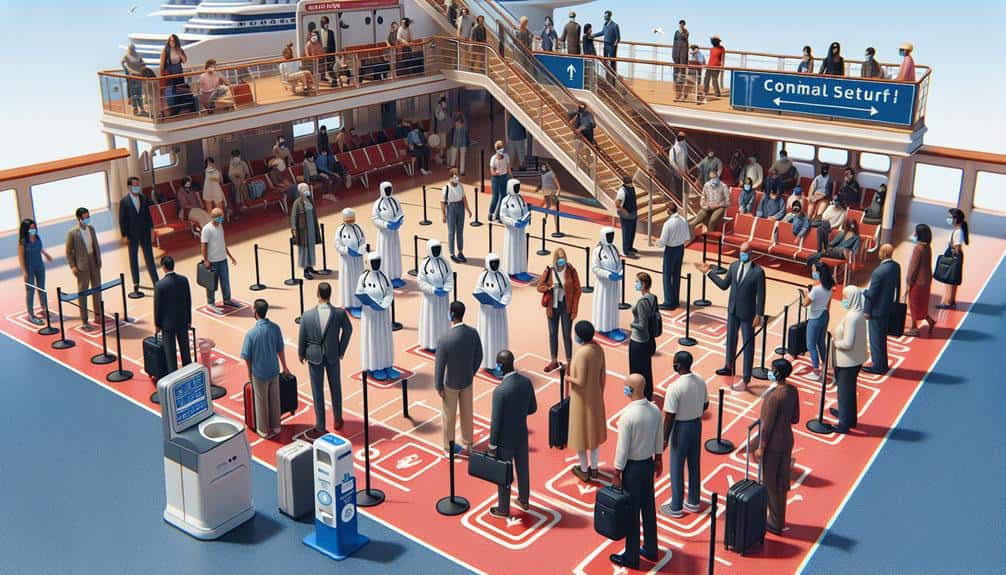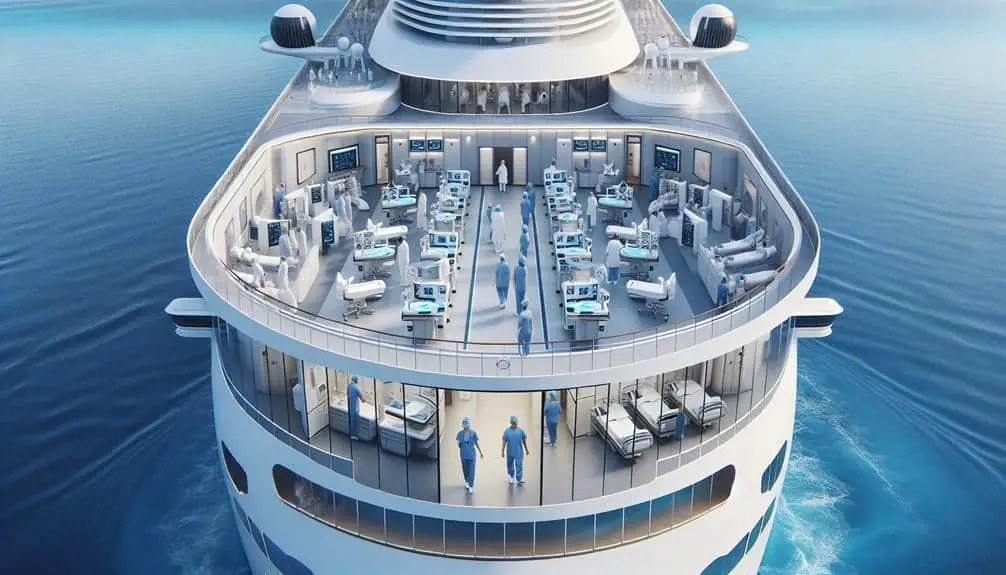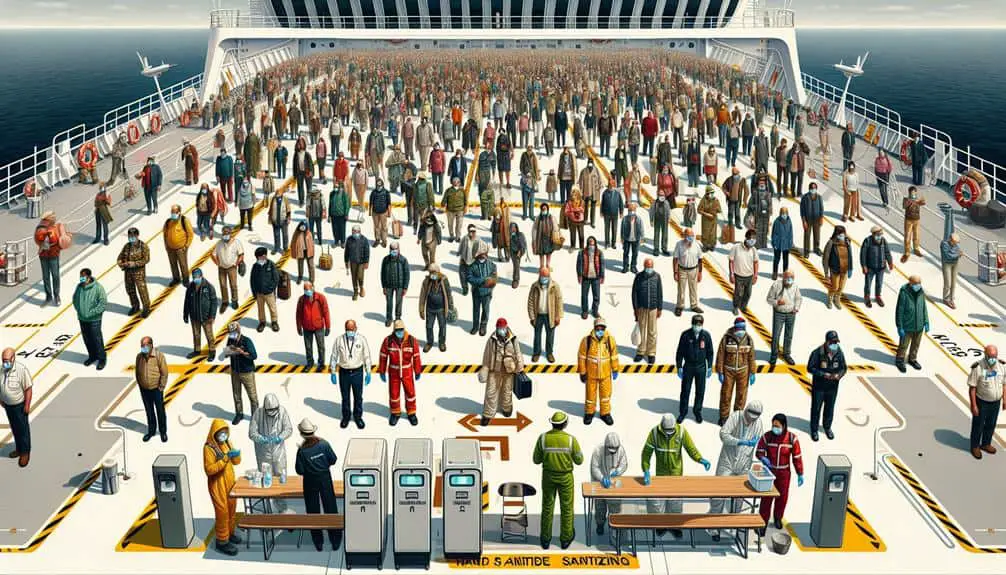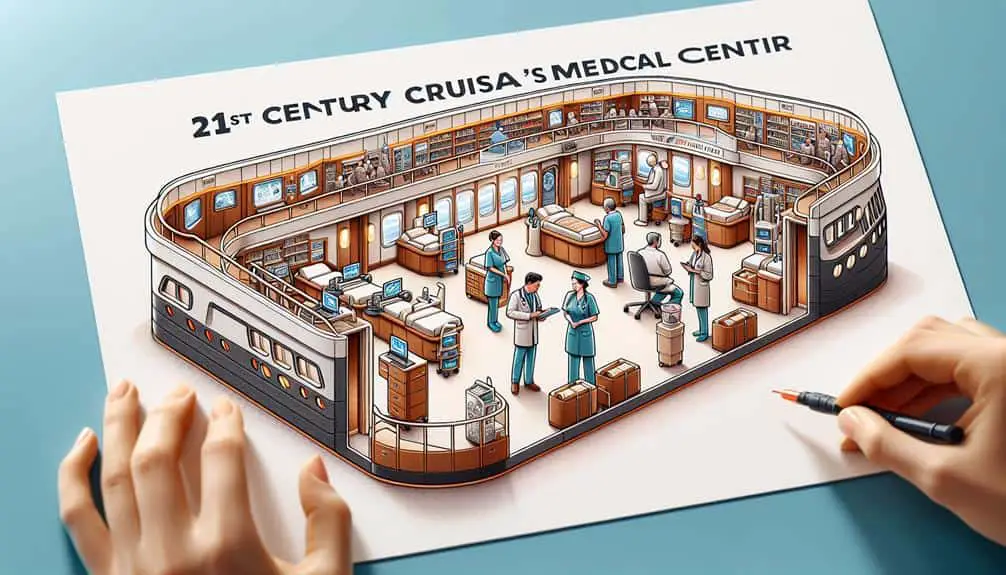Cruises enforce strict health precautions. Onboard medical facilities are equipped with advanced equipment. Health screenings include mandatory tests and temperature checks. Sanitization is prioritized, with frequent disinfection of high-touch areas. Ill passengers are isolated and monitored closely. Medical staff have vital certifications and experience. Guarantee peace of mind with these measures in place.
Key Points
- Comprehensive health screening procedures are mandatory.
- Enhanced sanitization measures are implemented onboard.
- Isolation protocols are followed for ill passengers.
- Onboard medical facilities are equipped with state-of-the-art equipment.
- Medical staff are highly qualified and trained in emergency response.
Onboard Medical Facilities
When booking a cruise, ensure that you familiarize yourself with the onboard medical facilities for your peace of mind and preparedness in case of any health concerns. Be sure to know the emergency response procedures and the medical equipment available on board. In the event of an emergency, the onboard medical staff is trained to handle a wide range of situations efficiently. They're equipped with state-of-the-art medical equipment to provide necessary care and treatment.
The emergency response team on the cruise ship is well-prepared to handle any medical situation that may arise during your voyage. They're trained to assess and respond promptly to emergencies, ensuring the safety and well-being of all passengers. Additionally, the medical facilities on board are stocked with essential medical equipment, including defibrillators, oxygen tanks, and medications, to address various health issues effectively.
Health Screening Procedures
Before embarking on your cruise, undergo comprehensive health screening procedures to guarantee a safe and healthy voyage. As part of these procedures, you can expect the following:
- Mandatory Testing: Be prepared to undergo mandatory testing for illnesses to safeguard the safety of all passengers and crew.
- Temperature Checks: Temperature checks will be conducted regularly to identify individuals who may have a fever, a common symptom of various illnesses.
- Health Questionnaires: You'll need to complete detailed health questionnaires to provide information about your current health status.
- Medical History Review: Your medical history will be reviewed to assess any potential risks or health concerns that may impact your cruise experience.
- Health Screening Staff: Trained health screening staff will be available to assist you throughout the screening process and address any health-related queries.
Enhanced Sanitization Measures
Amidst the ongoing concerns about health and safety, cruise lines have implemented enhanced sanitization measures to guarantee a clean and hygienic environment for all passengers and crew.
Enhanced cleaning protocols are rigorously followed on cruise ships to make certain high-touch surfaces like doorknobs, handrails, and elevator buttons are regularly disinfected. Additionally, public areas such as dining halls, entertainment venues, and fitness centers undergo frequent deep cleaning to maintain peak cleanliness standards.
Hand hygiene is a focal point of these enhanced sanitization measures. Cruise lines promote thorough handwashing with soap and water as well as the use of hand sanitizers placed strategically throughout the ship. Passengers and crew members are encouraged to practice proper hand hygiene to prevent the spread of germs and maintain a healthy environment onboard.
Isolation Protocols for Ill Passengers
To guarantee the well-being of all passengers and crew members, strict isolation protocols are swiftly activated for any individuals displaying symptoms of illness onboard cruise ships. Isolation procedures and quarantine guidelines are meticulously followed to contain the spread of any potential illnesses and maintain a safe environment for everyone on board.
Here are some key aspects of the isolation protocols for ill passengers:
- Vital Separation: Individuals showing symptoms are promptly isolated from the rest of the passengers and crew.
- Medical Evaluation: A thorough medical assessment is conducted to determine the nature of the illness and the necessary course of action.
- Quarantine Rooms: Designated quarantine rooms are utilized to provide a secure space for isolation while receiving medical care.
- Enhanced Monitoring: Continuous monitoring of the individual's health status is carried out to ensure timely intervention if needed.
- Communication Protocols: Clear communication channels are established to keep passengers and crew informed while respecting the privacy of the affected individual.
Adhering to these stringent isolation procedures is essential in safeguarding the health of everyone on board and preventing any potential outbreaks.
Medical Staff Qualifications
Medical staff qualifications play an essential role in ensuring the effective implementation of health protocols and the provision of quality care onboard cruise ships. When evaluating medical staff on a cruise, it's important to look for certifications such as Advanced Cardiovascular Life Support (ACLS), Basic Life Support (BLS), and Pediatric Advanced Life Support (PALS). These certifications guarantee that medical personnel have the necessary skills to respond to a wide range of medical emergencies promptly. Additionally, experience in emergency response situations is highly valuable.
Medical staff should be adept at handling various medical conditions and be able to provide initial care until the passenger can be transferred to a shoreside medical facility if needed. The ability to remain calm under pressure and communicate effectively with both patients and other staff members is paramount. Ensuring that the medical team onboard possesses the required certifications and experience assures that passengers can feel confident in the level of care they'll receive in case of a medical emergency while cruising.
Frequently Asked Questions
What Measures Are in Place to Prevent the Spread of Illnesses in Common Areas Such as Dining Rooms and Entertainment Venues?
In common areas like dining rooms and entertainment venues on cruises, food safety protocols, and entertainment hygiene measures are rigorously enforced. Illness prevention practices include regular disinfection, hand sanitizing stations, and staff trained in cleanliness best practices.
How Often Are High-Touch Surfaces Like Elevator Buttons and Handrails Cleaned and Sanitized?
To keep you safe, cleaning protocols on cruises include frequent sanitization of high-touch surfaces like elevator buttons and handrails. These measures guarantee a hygienic environment, lessening the risk of germ transmission.
Are Passengers Required to Wear Masks at All Times While Onboard the Cruise Ship?
In this controlled sea of safety, masks are your faithful companions. Exceptions allowed, but remember, they're like loyal crew members safeguarding health treasures. Dining rules steer you towards protected tables, ensuring a smooth voyage.
How Are Medical Emergencies Handled if a Passenger or Crew Member Requires Urgent Medical Attention While at Sea?
In case of medical emergencies at sea, swift medical response is essential. Communication with onboard clinics is crucial for assessment. If needed, emergency evacuation procedures are in place to guarantee prompt and proper care.
Are There Specific Protocols in Place for Handling Potential Outbreaks of Contagious Illnesses Onboard the Cruise Ship?
In handling potential outbreaks of contagious illnesses onboard a cruise ship, specific protocols are vital. Quarantine procedures, contact tracing, isolation rooms, and skilled medical staff are essential for swift response and containment. These measures guarantee passenger safety and health.



